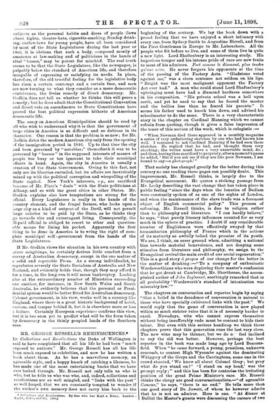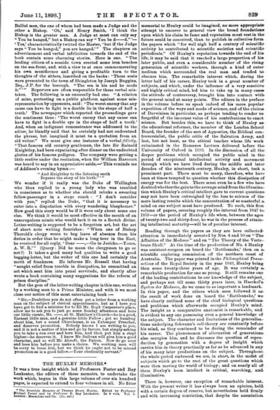MR. GEORGE RUSSELL'S REMINISCENCES.*
IN Collections and Recollections the Duke of Wellington is said to have complained that all his life he bad been "much exposed to authors." Mr. George Russell has all his life been much exposed to celebrities, and now he has written a book about them. As he has a marvellous memory, an agreeable style, and a happy knack of catching a likeness, he has made one of the most entertaining books that we have ever looked through. Mr. Russell not only tells us who is who, but he tells us who was who, and, indeed, collections and recollections are so well mingled, and "links with the past" so well forged, that we are constantly tempted to wonder if the author's own memory does not carry him back to the • Collfetions and Recollantiats. By One who has Kept a Diary. London ; Smith, Elder, and Co. 116a4
beginning of the century. We lay the book down with a proud feeling that we have enjoyed a short intimacy with every one, from Sydney Smith to Augustine Birrell, and from the First Gentleman in Europe to Mr. Labonchere. All the people who flit before us live, and some of them live in quite a new light. Lord Shaftesbury is an interesting study. His imperious temper and his intense pride of race are new traits to most of his admirers. Fort comme is diamant, plus tendre gu'une mere. He never forgave his opponents at the time of the passing of the Factory Acts. "Gladstone voted against me," was a stern sentence not seldom on his lips. "Bright was the most malignant opponent the Factory Act ever had." A man who could stand Lord Shaftesbury's upbringing must have had a diamond hardness somewhere in his composition. "His private school was a hell upon earth, and yet he used to say that he feared the master and the bullies less than he feared his parents." It seems his father used to knock him down, and advised his schoolmaster to do the same. There is a very characteristic story in the chapter on Cardinal Manning which we cannot refrain from quoting, though it gives a false impression of the tenor of this section of the work, which is eulogistic :—
" When Newman died there appeared in a monthly magazine a series of very unflattering sketches by one who had known him well. I ventured to ask Cardinal Manning if he had seen these sketches. He replied that he had, and thought them very shocking; the writer must have a very unenviable mind, &c. ; and then, having thus sacrificed to propriety, afters moment's pause he added, But if you ask me if they are like poor Newman, I am bound to say—a photograph."
That society has changed greatly for the better during this century no one reading these pages can possibly doubt. This improvement, Mr. Russell thinks, is largely due to the Evangelical movement. He quotes a striking passage from Mr. Lecky describing the vast change that has taken place in public feeling "since the days when the lunatics of Bedlam were constantly spoken of as one of the sights of London, and when the maintenance of the slave trade was a foremost object of English commercial policy." This process of softening, Mr. Russell thinks, is due to religion rather than to philosophy and literature. "I can hardly believe," he says, "that purely literary influences counted for so very much in the sphere of practice. I doubt if any considerable number of Englishmen were effectively swayed by that humanitarian philosophy of France which in the actions of its maturity so awfully belied the promise of its youth. We are, I think, on surer ground when, admitting a national bias towards material benevolence, and not denying some stimulus from literature and philosophy, we assign to the Evangelical revival the main credit of our social regeneration." This is a good story d propos of our change for the better in the matter of drinking :—" To a company of enthusiastic Wordsworthians who were deploring their master's confession that he got drunk at Cambridge, Mr. Shorthouse, the accom- plished author of John Inglesant, soothingly remarked that in all probability Wordsworth's standard of intoxication was miserably low."
The chapters on conversation and repartee begin by saying "that a belief in the decadence of conversation is natural to those who have specially cultivated links with the put." We would reply that the game of conversation is now played within so much stricter rules that it is of necessity harder to excel. Nowadays, wits who cannot express themselves without being insufferably rude mast be content to hide their talent. But even with this serious handicap we think these chapters prove that this generation runs the last very close.
The new wine may be thinner, but we do nf. • feel inclined to say the old was better. However, perhaps the best
repartee in the book was made long ago by Lord Beacons- field. When "he came forward, a young, penniless, unknown coxcomb, to contest High Wycombe against the dominating Whiggery of the Greys and the Carringtons, some one in the crowd shouted, 'We know all about Colonel Grey ; but pray what do you stand on?' ' I stand on my head,' was the prompt reply ; " and this has been for centuries the irritating position of the great Prime Minister's race. Mr. Russell thinks the clergy are good conversationalists,—" of agreeable Canons," he says, "there is no end." He tells more than one good story of Dr. Jowett, of whom he however admits that he is not an admirer. Here is one. "At dinner at Balliol the Master's guests were discussing the careers of two Balliol men, the one of whom had been made a Judge and the other a Bishop. Oh,' said Henry Smith, 'I think the Bishop is the greater man. A Judge at most can only say " You be hanged," but a Bishop can say "You be d—d."
Yes,' characteristically twitted the Master, but if the Judge says "You be hanged," you are hanged." The chapters on advertisement and verbal infelicities towards the end of the book contain some charming stories. Here is one. "The leading citizen of a seaside town erected some iron benches on the sea-front, and, with a view to at once commemorating his own munificence and giving a profitable turn to the thoughts of the sitters, inscribed on the backs: These seats were presented to the town of Shingleton by Joseph Bugging, Esq., J.P. for the borough. "The sea is his and he made it." ' " Reporters are often responsible for these verbal mis- takes. The following is an unusually bad one. "A relation of mine, protesting on a public platform against some mis- representation by opponents, said : 'The worst enemy that any cause can have to fight is a double lie in the shape of half a truth.' The newspaper which reported the proceedings gave the sentiment thus : The worst enemy that any cause can have to fight is a double eye in the shape of half a tooth.' And, when an indignant remonstrance was addressed to the editor, be blandly said that he certainly had not understood
the phrase, but imagined it must be a quotation from an old writer." We must give one instance of a verbal felicity.
"That famous old country gentleman, the late Sir Rainald Knightley, had been expatiating after dinner on the undoubted glories of his famous pedigree. The company were getting a little restive under the recitation, when Sir William Harcourt was heard to say in an appreciative aside,—' This reminds me of Addison's evening hymn:—
" And Knightley to the listening earth Repeats the story of his birth." ' "
We wonder if it really was the Duke of Wellington who thus replied to a young lady who was troubled in conscience as to whether she should rebuke a swearing fellow-passenger in a stage coach : "I don't consider with you," replied the Duke, "that it is necessary to enter into a disputation with every wandering blasphemer." How good this story would be if it were only about some one else. We think it would be most effective in the mouth of an unscrupulous mimic who would tack it on to a Scotch divine.
Letter.writing is supposed to be a forgotten art, but the art of short note writing flourishes: "When one of Bishop
Thorold's clergy wrote to beg leave of absence from his duties in order that he might make a long tour in the East,
he received for all reply, 'Dear —,—Go to Jericho.—Yours,
A. W. R." (Query : Did he mean the clergyman to go or not F) It takes a good many bad qualities to write a good begging-letter, but the writer of this one had certainly the
merit of frankness. He informs Mr. Russell that having "sought relief from trouble in dissipation, he committed an act which sent him into penal servitude, and shortly after wrote a book containing many suggestions for the reform of prison discipline."
But the gem of the letter-writing chapter is this one, written by a working man to a Prime Minister, and with it we must close our notice of this most entertaining book :—
"Sir,—Doubtless you do not often get a letter from a working man on the subject of clerical appointments, but as I here you have got to find a minister for to fill Mr. Boyd Carpenter's place, allow me to ask you to just go some Sunday afternoon and here our little curate, Mr. —, at St. Matthew's Church—he is a good, Earnest little man, and a genuine little Fellow ; got no humbug about him, but a sound Churchman, is an Extempor Preacher, and deserves promotion. Nobody knows I am writing to you, and it is not a matter of kiss and go by favour, but simply asking you to take a run over and here him, and then put him a stept higher—he deserves it. I know Mr. Sulivan will give him a good character, and so will Mr. Alcroft, the Patron. Now do go over and here him before you make a choice. We working men will be sorry to loose him, but we think he ought not to be missed promotion as is a good fellow.—Your obediently servant."







































 Previous page
Previous page